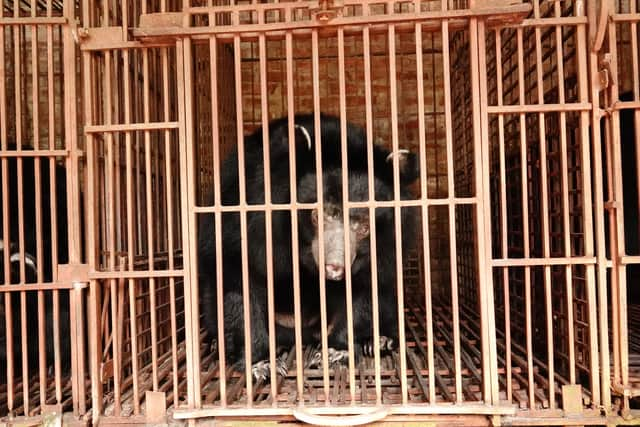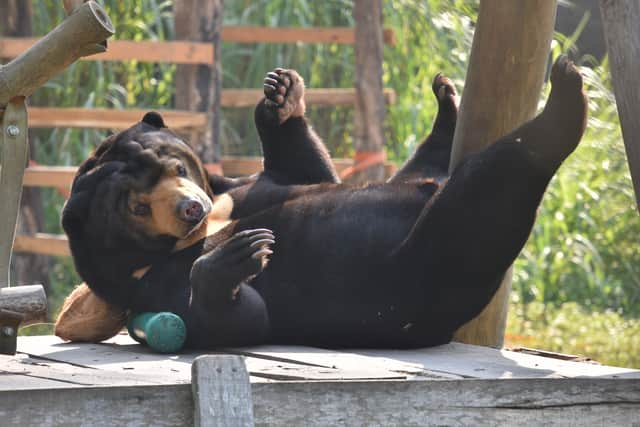What is bear bile farming? Celebrity A-listers join campaign to fund sanctuary home for Vietnam's 'last 300'
This article contains affiliate links. We may earn a small commission on items purchased through this article, but that does not affect our editorial judgement.
and live on Freeview channel 276
A string of celebrity A-listers have joined a new campaign and sponsored bears to raise money for a new sanctuary in Southeast Asia - to save the last 300 bears trapped on Vietnamese bile farms.
The 'No Bear Left Behind' campaign, launched on Wednesday (22 November), has seen the likes of Stephen Fry, Slash, Joaquin Phoenix, Ricky Gervais, Judi Dench, Peter Egan and Lesley Nicol come together to to help end the controversial practice - which sees bears kept in small cages having fluid extracted from their gallbladders - in Vietnam for good. They are working with Animals Asia and the Vietnamese government, which banned bear bile farming in 2005, giving farmers until 2025 to shut up shop.
Advertisement
Hide AdAdvertisement
Hide AdInternational wildlife charity Animals Asia say they plan to work farm by farm, until there are no bears left trapped in tiny cages, "in some cases little bigger than they are", in "unimaginable pain" from invasive procedures. Their new 12-hectare sanctuary - in the mountains of Bach Ma National Park - has just had its official grand opening. It currently has capacity for 60 bears, but the charity needs more funding to complete the project, and ensure all 300 bears still on farms have a home to go to.


"Here these once abused bears will enjoy the rest of their days without pain and suffering," a spokesperson said. "They will have delicious and nutritious food, specialist veterinary care and for many it will be the first time they have space to play outside, feel grass under their paws and meet other bears."
The charity plans to rescue five bears every month in 2024, and assist the Vietnamese government in making sure there are none left on farms illegally by 2026. It is now asking members of the public to donate, to support the rest of their sanctuary project.
Actor Peter Egan has adopted a bear and named it Peter, after himself, after a trip to visit Animals Asia's new sanctuary - as well as its now-full existing sanctuary in Tam Dao to meet the rescued bears, and see them enjoying their new life. Dame Judi Dench has named her adopted bear Finty, after her daughter, while Lesley Nichol has named hers King Darbs.
Advertisement
Hide AdAdvertisement
Hide Ad

Why are bears farmed for their bile?
Bear bile is an ingredient used in traditional Chinese medicine, also produced in several Southeast Asian countries. It is reputed to cure everything from acne and hangovers to sore throats and even cancer - with little to no scientific evidence. It is marketed in various ways, and can be found in products from teas and wines to face creams.
The National Geographic reports that in the early 1900s, scientists discovered that bear bile - which comes from the gallbladder - does contain more ursodeoxycholic acid than bile from many other animals, which does have positive effects on some conditions, like gallstones and liver disease. However, there are many cruelty-free sources of this acid, which can also be produced synthetically.
Animals Asia says in commercial bear bile farming, the fluid is extracted using invasive surgical techniques like catheters inserted into the gallbladder - sometimes with the bears forced to wear metal 'jackets' to keep them in place. The animals can live upwards of 30 years in captivity, which often involves them living in tiny cages undergoing repeated invasive procedures - rarely performed by vets - until their death.
On top of this, the bear species of choice - sun and moon bears (or Asian black bears) - both native to different parts of Asia, are both considered vulnerable to extinction. Many of the bears used in bear farming are taken as cubs from the wild, Animals Asia says, placing further strain on their dwindling populations.
People interested in donating to the campaign can find out more here.
Comment Guidelines
National World encourages reader discussion on our stories. User feedback, insights and back-and-forth exchanges add a rich layer of context to reporting. Please review our Community Guidelines before commenting.
